- Beginner's Guide
- Past Papers
- CSP Members
- Members List
- Social Groups
- Mark Forums Read
- Current Affairs
- Pakistan Affairs
- World In Focus
- ESSAYS: CSS/PMS/PCS
- English (Precis & Composition)
- Pakistan Affairs MCQS
- Islamic Studies MCQS
- General Science & Ability MCQS
- Mathematics
- Everyday Science
- Scholarships
- Etimes Urdu
- Our Services


Pros and Cons of Globalization CSS ESSAY 2021
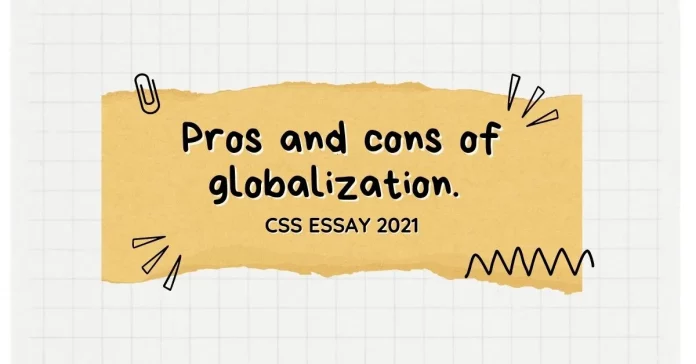
Table of Contents
Thesis Statement
Globalization has brought numerous advantages and disadvantages to the world, impacting various aspects of society, economy, and culture. In this This essay we will explore the pros and cons of globalization, highlighting its benefits in terms of economic growth, technological advancements, and cultural exchange, while also discussing its challenges related to inequality, cultural homogenization, and environmental concerns.
Introduction
Globalization has become a defining feature of the modern world, shaping various aspects of society, economy, and culture. As nations have become more interconnected and interdependent, it is important to examine the pros and cons of this phenomenon. While globalization has brought numerous benefits such as economic growth, technological advancements, and cultural exchange, it has also presented challenges including inequality, cultural homogenization, and environmental concerns. This essay will explore these pros and cons, shedding light on the complexities of globalization.
Exposition: Understanding Globalization
Globalization can be defined as the increasing interconnectedness and interdependence of nations in various aspects, including trade, communication, and technology. It has its roots in historical developments such as the expansion of trade routes and colonialism. However, it has gained momentum in recent decades due to advancements in transportation, communication, and the liberalization of trade policies. Globalization has enabled the flow of goods, services, capital, and information across borders, leading to increased global integration.
Pros of Globalization
Economic growth and development.
One of the key advantages of globalization is the potential for economic growth and development. Increased trade and investment opportunities have opened up new markets and expanded access to consumers worldwide. Businesses can now reach customers in different countries, leading to job creation, enhanced productivity, and overall economic prosperity. Globalization has also facilitated the transfer of technology and knowledge, fueling innovation and economic progress.
Technological Advancements
Globalization has accelerated the dissemination of information and knowledge through advancements in technology. The rapid exchange of ideas and expertise has led to breakthroughs in various fields, driving technological advancements. Innovations in areas such as communication, transportation, and medicine have transformed industries and improved the quality of life. Global collaboration and knowledge sharing have become easier, fostering scientific and technological progress.
Cultural Exchange and Diversity
The interconnectedness brought about by globalization has facilitated cultural exchange and diversity. People have greater exposure to diverse cultures, ideas, and perspectives from around the world. This exposure enriches societies by promoting cross-cultural understanding, tolerance, and appreciation. The exchange of artistic, literary, and culinary traditions has broadened cultural horizons, fostering a global tapestry of diversity and creativity.
Cons of Globalization
Economic inequality.
Despite the potential for economic growth, globalization has also led to increased economic inequality. The benefits of globalization are not evenly distributed, and wealth and resources tend to concentrate in the hands of a few. Developing countries often face challenges in competing with more developed nations, leading to disparities in wealth and living standards. Additionally, the exploitation of cheap labor in some parts of the world has raised concerns about fair trade practices and workers’ rights.
Cultural Homogenization
The dominance of Western cultural values and consumerism is a significant challenge posed by globalization. As global markets expand, there is a tendency for cultural homogenization, where local traditions and identities are marginalized or eroded. The influence of Western media, fashion, and entertainment can overshadow indigenous cultures, leading to the loss of cultural diversity. Preserving and promoting local traditions and languages becomes crucial in maintaining cultural richness and identity.
Environmental Concerns
Globalization has also raised environmental concerns. The increased movement of goods and people has resulted in higher carbon emissions and an ecological footprint. The overexploitation of natural resources to meet global demand poses threats to biodiversity and ecosystems. Environmental challenges, such as climate change and deforestation, require international cooperation and sustainable practices to mitigate their impact.
Addressing the Challenges
To manage the challenges of globalization, various strategies can be employed.
Economic Reforms and Redistribution
Implementing fair trade practices, ensuring workers’ rights, and promoting inclusive economic policies are essential in reducing economic inequality. Progressive taxation can help redistribute wealth and address disparities in income distribution.
Preserving Cultural Diversity
Supporting local arts, traditions, and languages is crucial in preserving cultural diversity. Governments and communities can take measures to protect and promote their cultural heritage, fostering intercultural dialogue and understanding.
Sustainable Development and Environmental Stewardship
Investing in renewable energy, adopting sustainable production and consumption practices, and strengthening international agreements on climate change and environmental protection are necessary steps in addressing environmental concerns. Global cooperation is vital in tackling shared environmental challenges.
Case Studies and Examples
Numerous case studies demonstrate both the positive impacts and negative consequences of globalization. For instance, countries like China and India have experienced remarkable economic growth and poverty reduction as a result of globalization. On the other hand, social unrest and environmental degradation have been observed in some regions due to unsustainable development practices.
Globalization is a multifaceted phenomenon with both benefits and challenges. While it has contributed to economic growth, technological advancements, and cultural exchange, it has also raised concerns regarding inequality, cultural homogenization, and environmental sustainability. Addressing these challenges requires a balanced approach that maximizes the benefits of globalization while mitigating its negative impacts. By promoting inclusive economic policies, preserving cultural diversity, and embracing sustainable practices, societies can navigate the complexities of globalization and create a more equitable and sustainable world.
RELATED ARTICLES MORE FROM AUTHOR
Boys will be boys css essay 2022, is pakistan ready for the digital revolution css essay 2020, i do not agree with what you have to say, but i’ll defend to the death your right to say it. css essay 2020, leave a reply cancel reply.
Save my name, email, and website in this browser for the next time I comment.
- Privacy Policy

- Maleeha Sattar
- March 19, 2024
- CSS , CSS Essays , CSS Solved Essays
- 30705 Views

- March 18, 2024
- CSS , CSS Essays , CSS Solved Essays , Uncategorized

- March 17, 2024

- Khalid Nazir
- February 28, 2024

- Quratulain Babar

- Fahad Farooq

- February 26, 2024

- Hamail Syed
Recent Posts

Top Categories
Cssprepforum, education company.

cssprepforum.com
Welcome to Cssprepforum, Pakistan’s largest learning management system (LMS) with millions of questions along with their logical explanations educating millions of learners, students, aspirants, teachers, professors, and parents preparing for a successful future.
Founder: Syed Kazim Ali Founded: 2020 Phone: +92-332-6105-842 +92-300-6322-446 Email: [email protected] Students Served: 10 Million Daily Learners: 50,000 Offered Courses: Visit Courses
Subscribe to our mailing list to receives daily updates direct to your inbox.

- CSS Solved Essays
- CSS Solved GSA
- CSS Solved PA
- CSS Solved Islamiat
- Current Affairs
- All Courses
- Writers Club
- All Authors
- All Members
- All Teachers
- Become an Author
- Who is Sir Syed Kazim Ali?
- Privacy Policy
CssPrepForum is Pakistan’s largest and greatest platform for CSS, PMS, FPSC, PPSC, SPSC, KPPSC, AJKPSC, BPSC, GBPSC, NTS, and other One Paper 100 Marks MCQs exams’ students. It has become Pakistan’s most trusted website among CSS, PMS students for their exams’ preparation because of its high-quality preparation material.
@ 2023 Cssprepforum. All RightsReserved.

Pros and Cons of Globalization – CSS Essay
Note: The topic “Pros and Cons of Globalization” came in the CSS Essay Paper – 2021. The admin attempted the following essay and cleared this exam.
Please be clear that we have broken the paragraphs for clarity. However, this is not recommended in essay writing. You have to follow the proper structure of essay writing .
Globalization is defined as the free flow and movement of people, ideas, information, and goods across borders.
It was in the second half of the twentieth century that the world witnessed a conspicuous shift from Nationalism and Mercantilism to Globalization and International Liberal Economic Order.
The main motive behind free trade and globalization was mutual interests and gains. Countries opened up their borders. Ultimately, it marked the beginning of a new era defined by the free movement of goods and people across the border.
Primarily, it was the end of World War II that marked the setting up of global institutions like the United Nations, the International Court of Justice, the World Trade Organization (erstwhile General Agreement on Tariffs and Trade), etc.
It was believed that these institutions will help in maintaining peace in the world and avoid another major global war or conflict.
In short, from the latter half of the 20 th century till the present, the world remained largely globalized.
Since we have witnessed the entire period of globalization, we can fairly analyze the pros and cons of globalization from hindsight.
So, is globalization good? Does it provide a win-win situation for every country? Are there some drawbacks or cons of globalization too? Let’s dig into details to find answers.
5 Major Pros of Globalization
Globalization offers multiple advantages acknowledged by everyone and denied by none. Following are a few major pros of globalization.
1. Globalization offers Mutual Cooperation & Development
In the past, when the world was non-globalized and nationalism was prevailing, there was a lack of cooperation between states. Even, countries were suspicious of each other. The focus was on self-development and progress. States never cooperated with each other for mutual progress and development.
With the advent of globalization, today’s states are cooperating with each other in the field of education, science, and technology. Moreover, states are working on the basis of mutual intelligence sharing for enhanced security.
For instance, in the recent pandemic crisis, how China has sent medical supplies and teams across borders and oceans clearly highlights the essence of globalization. Those states that were missing ventilators, vaccines, etc got help from other states in fighting Covid-19.
This is an example from recent times. For other example, the spread of Information and Communication Technology across the world is also a hallmark of globalization.
There are multiple regional-level and global-level organizations active today. For example, SAARC, ASEAN, SCO, UNO, WTO, etc all work for the mutual interests of the member countries.
Hence, mutual cooperation and the development of countries are among the most prominent advantages of globalization.
2. Globalization offers more Peace in the World
It is no denying the fact that globalization has brought peace to the world. Though we do witness wars and conflicts even today, those are not on such large scales as in the pre-globalized world.
The pre-globalized world had witnessed two great wars in the 20 th century and many even before that. While the states were not interconnected, they remained suspicious of each other’s strengths, motives, and activities. They lacked mutual interests and goals.
Today, the role played by global institutions in the maintenance of world peace is commendable.
Moreover, in today’s globalized world, states are working on common interests and are dependent on each other. With mutual dependency, they are pursuing common economic interests in the form of trade. With each other’s help, states are advancing in science and technology.
Such interdependency has altogether dismissed the chances of any major global conflict in the future.
Moreover, globalization has enhanced people-to-people contact. When people from different cultural backgrounds meet each other and learn about other cultures, it creates a feeling of harmony and goodwill among them. This ultimately promotes peace among nations.
3. More Employment Opportunities for Individuals in a Globalized World
In today’s globalized world, there are multiple employment opportunities for individuals. To explain this fact, we see that multiple multinational companies are working with their branches installed across borders. These companies employ manpower from third-world countries. Thus, those who couldn’t find jobs in local companies or in other public sectors get better employment opportunities.
Moreover, today people also find opportunities to find lucrative jobs across borders. For instance, the report says that 2.7 million Pakistani expatriates are living in Saudi Arabia and working there. It is entirely due to the globalized world that these Pakistani got a chance to better living.
Moreover, educated people also find better opportunities for better employment across borders.
Thus, with enhanced employment opportunities, globalization can actually lift people out of poverty.
4. Market Competition keeps the Prices Down
Another major benefit of globalization and free trade is that the prices of commodities remain down.
As globalization has eradicated monopolies with multiple multinational companies competing for markets, these companies try to keep their product prices down to beat the competitors.
Ultimately, it benefits the locals residing in the country who can access the goods at a lower and justified price.
5. Better Educational Opportunities for Students
In today’s globalized world, where people can freely move across borders, students get better educational opportunities.
Today, one can search and apply for any foreign university via the internet.
Moreover, the internet and information technology have also introduced (esp. during Covid-19 times) E-learning and online classes.
So, students do not actually have to move abroad but attend classes from the comforts of home.
4 Prominent Cons of Globalization
As we have discussed some prominent pros of globalization, let us also highlight some major cons of globalization.
1. Exploitation of Poor States by the Rich States
One major argument that goes against globalization is the exploitation of poor states or the global South by rich states or the global North.
This exploitation occurs in the following many ways.
Globalization is said to be a new version of colonialism. During colonialism , rich states exploited poor states by taking their raw materials and dumping finished goods in their markets for financial gains.
This is equally true for globalization. Big multinational companies hire skilled labor from poor countries by paying them better. This results in the closure of local companies in poor states as they cannot hire the same skilled labor for the same wages.
Moreover, small companies in some poor countries cannot compete with bigger multinational companies in global markets.
We can say that globalization further fosters unequal relations between countries or companies.
Furthermore, when big companies install their set-up in third-world countries, apart from exploiting its resources and manpower, it also spoils the atmosphere of that country with the emission of carbon.
In short, globalization has resulted in the exploitation of the poor by the rich in multiple ways.
2. Globalized world poses threats to Cultures | Cultural Assimilation
As with globalization comes great intermingling of people through the cross-border movement of people.
Through this process, different cultures come in close contact. This often results in cultural assimilation where people of one culture tend to adopt the norms and values of the other major culture.
Thus, it poses a great threat to the smaller culture as it might wither away for good.
For instance, if we take the example of Pakistan, the people of Pakistan are adopting western culture, learning their (English) language, adopting their lifestyle, dressing like them, and largely becoming oblivion to their own unique cultural norms and values . This is happening because of globalization.
3. Emerging Non-Traditional Security Threats
This can be best understood from the recent Covid-19 pandemic spread across the world. Ironically, it was China who sneezed first and the rest of the world caught a cold.
Today’s globalized world is more prone to be affected by any pandemic or viral disease within a few days. With the free flow of people and goods across the open borders can travel any sort of virus freely.
For instance, the spread of the Swine Flu, Ebola Virus, and Covid-19, to name a few, was the result of well-interconnectivity in the world.
Similarly, there is also a threat to the economy due to the interconnected world.
As we have seen in 2008, how the impacts of the Great Recession in the United States were felt all over the world. Thus, an economic disturbance in one state causes a disturbance in the whole world’s economy today.
4. Growing Terrorism
Globalization also offers terrorists a healthy atmosphere to spread and grow. Today, terrorist networks are fast spreading and growing.
With open borders and free movement, these terrorists can move anywhere with ease.
It was only possible because of globalization that terrorists planned and attacked the twin towers of the USA in 2001 from Afghanistan (as it is believed).
Moreover, the spread of ISIS, the Taliban, and various other terrorist organizations is also a fallout of globalization. These terrorist outfits are recruiting people from across the world with great ease in today’s globalized and connected world.
Wrapping Up
Although there are multiple pros and cons of globalization and some of them have been discussed in this write-up, overall the pros of globalization outweigh the cons.
Today, we cannot even think of going back to the pre-globalized world ridden with conflicts and lack of development.
However, today, world communities together with mutual cooperation can work on eliminating the drawbacks of globalization.
We can only hope for a better future for the world through mutual cooperation of states and the strengthening of globalization.
You may also like

Is Technology Making Us Less Human?

Essay on Islamophobia for CSS Exam

International Relations (IR) MCQs from CSS Past Papers...
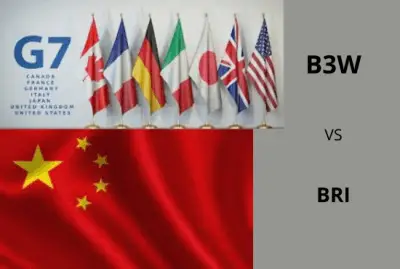
B3W vs BRI | A Detailed Comparative Analysis


Friendship Essay in English for Students | 700 Words

Child Labour Essay | 1400 Words
About the author.
A versatile human being with a passion for reading and writing - always striving for growth, living in the moment but trying to keep pace with the evolving world.
[…] The topic has been taken from CSS Essay Paper – 2020 ALSO READ: Pros & Cons of Globalization Spread the […]
[…] Pros and Cons of Globalization […]
Leave a Comment X
Save my name, email, and website in this browser for the next time I comment.

Essay on Globalization for Students and Children
500+ words essay on globalization.
Globalization refers to integration between people, companies, and governments. Most noteworthy, this integration occurs on a global scale. Furthermore, it is the process of expanding the business all over the world. In Globalization, many businesses expand globally and assume an international image. Consequently, there is a requirement for huge investment to develop international companies.

How Globalization Came into Existence?
First of all, people have been trading goods since civilization began. In the 1st century BC, there was the transportation of goods from China to Europe. The goods transportation took place along the Silk Road. The Silk Road route was very long in distance. This was a remarkable development in the history of Globalization. This is because, for the first time ever, goods were sold across continents.
Globalization kept on growing gradually since 1st BC. Another significant development took place in the 7th century AD. This was the time when the religion of Islam spread. Most noteworthy, Arab merchants led to a rapid expansion of international trade . By the 9th century, there was the domination of Muslim traders on international trade. Furthermore, the focus of trade at this time was spices.
True Global trade began in the Age of Discovery in the 15th century. The Eastern and Western continents were connected by European merchants. There was the discovery of America in this period. Consequently, global trade reached America from Europe.
From the 19th century, there was a domination of Great Britain all over the world. There was a rapid spread of international trade. The British developed powerful ships and trains. Consequently, the speed of transportation greatly increased. The rate of production of goods also significantly increased. Communication also got faster which was better for Global trade .
Finally, in 20th and 21st -Century Globalization took its ultimate form. Above all, the development of technology and the internet took place. This was a massive aid for Globalization. Hence, E-commerce plays a huge role in Globalization.
Get the huge list of more than 500 Essay Topics and Ideas
Impact of Globalization
First of all, Foreign Direct Investment (FDI) increases at a great rate. This certainly is a huge contribution of Globalization. Due to FDI, there is industrial development. Furthermore, there is the growth of global companies. Also, many third world countries would also benefit from FDI.
Technological Innovation is another notable contribution of Globalization. Most noteworthy, there is a huge emphasis on technology development in Globalization. Furthermore, there is also technology transfer due to Globalization. The technology would certainly benefit the common people.
The quality of products improves due to Globalization. This is because manufacturers try to make products of high-quality. This is due to the pressure of intense competition. If the product is inferior, people can easily switch to another high-quality product.
To sum it up, Globalization is a very visible phenomenon currently. Most noteworthy, it is continuously increasing. Above all, it is a great blessing to trade. This is because it brings a lot of economic and social benefits to it.
Customize your course in 30 seconds
Which class are you in.

- Travelling Essay
- Picnic Essay
- Our Country Essay
- My Parents Essay
- Essay on Favourite Personality
- Essay on Memorable Day of My Life
- Essay on Knowledge is Power
- Essay on Gurpurab
- Essay on My Favourite Season
- Essay on Types of Sports
Leave a Reply Cancel reply
Your email address will not be published. Required fields are marked *
Download the App

- Privacy Policy
- Our Authors
- Subscribe Us
- Google Plus

Economy of Pakistan – Challenges and Prospects (CSS Essay)
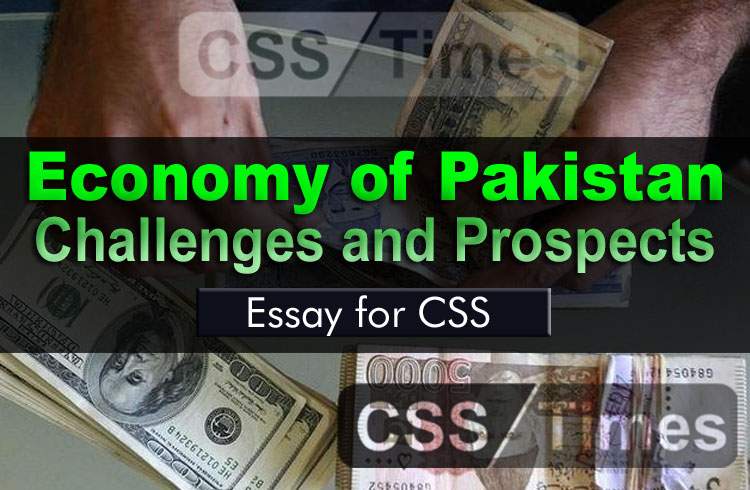
Table of Contents
1. Introduction
Pakistan today, confronts multiple challenges which vary in intensity. Some of the challenges appear to be multi-dimensional and complex in nature which certainly will take many years to overcome. Interestingly, a few of the problems and challenges have been self-inflicted by the powerhouses that have caused a widespread socio-economic damage to this country. This way, the poor economy of Pakistan remains the chieftain among the challenges since the country’s birth. The weak and fragile structure and the picture of the economy of Pakistan are what inevitably produce other inter-linked social challenges, such as poverty and corruption.
One gets to know that ever-rising inflation, increasing unemployment, shrinking GDP and diminishing exports level are the major obstacles which restrict the ability of Pakistan to have a well-developed and flourishing economy. According to the Economic Survey of Pakistan 2016-17, the inflation rate in Pakistan grew to 5.02% from 4.78%; GDP growth rate went up to 4.71% from 4.04%; unemployment rate declined to 5.9% from 6%; interest rate is 5.75% which remains the same. Although the economic indicators are, by the large, not appreciable but a slight increase in GDP seems to be the positive development.
2. An Overview.
In 1947, Pakistan had 30 million people with per capita income of 100$. Agriculture accounted for almost 50% of economic output with hardly any manufacturing, as all industries were located in India. Therefore, it was unable to feed 30 million people and was dependent on PL-480 imports from the USA. From thereon, Pakistan has come a long way. Today with 170 million people, our per capita income in 2008 was 1000$ which was ten times more. Pakistan is the third largest exporter of rice in the world and producing enough food grains to feed its people. 3 million tons of rice is exported every year by Pakistan which is surplus to our requirements. Pakistan is also one of the five major textile producing countries in the world. So if we measure in relation to where we were vis-à-vis structure of economy, agriculture has come down from 50% to 20%. Therefore, out of total national income, agriculture’s contribution is just 20%, but instead of being deficient in food production, we are actually surplus and that is what productivity means i.e. by using the same land you produce more from the same inputs, that is how economic growth takes place. Agriculture is not only crops, within agriculture there has been a significant change. Livestock, dairy, mutton, beef, poultry and similar other products is 50% of agriculture output in Pakistan. Pakistan also produces third largest quantity of milk in the world. So within agriculture sector, there is a change i.e. major crops are only 36% of agriculture value added and 14% are minor crops, fisheries, orchards, fruits and vegetables. Thus, we are moving in a direction where the same land and same resources are being used more efficiently in order to produce more. As a contrast, agriculture is only 2.5% in the US having a population of 300 million, out of which they not only feed the entire population, but also export to the rest of the world. Therefore, it is important to understand that when it is said that agriculture is producing/contributing more, it is the productivity of agriculture rather than the share of agriculture in GDP. Manufacturing and industry now account for 25% of the income; when we recall there was not even a single industry worth its name at the time of partition. So if we look where we were and where we are, I think the justification for Pakistan in terms of betterment of economic conditions of Muslims in this part is very strong. But where we have failed is that we have not lived up to our potential. In 1969, Pakistan exports of manufactured goods were higher than the combined exports of Indonesia, Malaysia, Philippines and Thailand. In 1960’s Korea emulated Pakistan in its five years planning process. The tragedy is that even a country such as Vietnam which was completely devastated by the war has now overtaken Pakistan. Ten years ago, India which was way behind Pakistan (till 1990’s) is now way ahead. As an economist and student of globalization, the biggest challenge is: how can we organize ourselves to reach that position where at least we can be running not at the nine second a mile but at least ten second a mile race which is going on in the global economy.
3. Challenges to Pakistan’s Economy
(a) we consume more and save less..
People in Pakistan save only 14 pc of their monthly salary generally while worldwide, the average standard of savings is 27 pc. This is the contrast as to why we are in serious difficulty because as a nation this is a problem which we have to recognize. We have to at least double on savings rate otherwise we will remain dependent on foreign sources.
In Pakistan educated people are also more likely to keep their savings at home instead of in the banks.
This was disclosed by Standard Chartered Bank’s study ‘Emerging Affluent Consumers in Asia – The Race to Save’. This survey was conducted in 8 countries including China, Hong Kong, Singapore, India, Taiwan, Korea, Kenya and Pakistan. The survey further said that emerging affluent consumers in Asia could boost their savings by an average of 42 per cent if they move from a basic savings approach to a low-risk wealth management strategy.
(b) We Import More and Export Less.
Pakistan’s trade deficit has hit a record level of 30 billion US dollars in the first 11 months of 2016-17, showing a jump of 42 per cent as compared to the same period in the previous financial year. Exports have declined by three per cent to 18.5 billion US dollars while imports have gone up by 21 per cent to 48.5 billion US dollars. As a nation we prefer to use even the basic commodities of foreign countries rather than locally manufactured goods. Unless we do not change this attitude of preferring the imported goods we have to keep on relying on outsiders to fill in this gap b/w our imports and exports. Relying on outsiders’ means that there are cycles, ups, and downs i.e. when things are good, one gets financing, and when things are bad one starves for financing. No nation which strives to preserve its honour must go through this particular route. The lower is this gap between our export earnings and expenditure on imports – and that can be achieved only by expending our exports; our reliance on external sources would be reduced.
(c) Government spends more than it earns as Revenues.
Fiscal deficit is the difference between the revenues which are collected in a year and the total expenditure incurred by the Government. Pakistan’s government takes away 20% of national income as its own. 80% is left in the private sector and 20% in the hands of the government is spent on defence, debt servicing, development on education, health, general administration etc. Country’s budget deficit, a gap between expenditures and revenues, was recorded at 5.8 percent of the GDP during FY2017 as against the target of 3.8 percent of the GDP. In expenditures, the government had spent Rs888.1 billion on the country’s defence. Similarly, a massive amount of Rs1348.4 billion was spent on paying the country’s interest on domestic as well as foreign borrowings. The government had earmarked Rs.1,360 billion in annual budget for paying interest on domestic as well as foreign loans during fiscal year that started from July 2016 and ended in June 2017. The revenue generated is only 15% of the GDP at best, and in the worst days it is 12 to 13%. Out of the every rupee of income received by a Pakistani, on average, tax paid is only 9 paisas and 91 paisas remain with the individual. In 2007-2008, Pakistan’s fiscal deficit was more than 7% which means its income or revenues were only 13% of GDP whereas, expenditures were 20%. Therefore, fiscal deficits have to be financed from somewhere, so how do you finance them; you either go again begging the external donors, or to the State bank of Pakistan. The financing provided by the State bank of Pakistan is dangerous because it creates high inflation in the economy, which is injurious to the middle class, those earning fixed wages and salaries, and the poor. Therefore, there is an uproar in the country if the inflation rate goes up. Continuing large fiscal deficits year after year may plunge the country into debt trap again.
(d) Our Share in the World Trade is shrinking.
In 1990, Pakistan’s share was 0.2% of the world trade. After 20 years it has come down to 0.12% in a very buoyant world economy. World trade has been growing faster as compared to the world output. India in the same period had doubled its share from 0.7% to 1.4%, while Pakistan is going the other way and that is the reason why exports/imports imbalance is increasing. We are not taking advantage of the opportunities which a buoyant world economy is providing. Pakistan is stuck with only a few commodities – textiles, leather, rice, sports, goods and the surgical goods. We have not entered the markets for more dynamic products. All our exports are to a few markets – the USA, EU and the Middle East. So this narrow export base and very limited geographical spread are not allowing us to expand our share. Unless we improve the quality of our products, go out and do the marketing abroad, invest in research and development, the prospects do not look promising. That is why we are lagging behind other countries which from way back are over taking Pakistan.
(e) We Badly Lag in Social Indicators.
One of the most glaring weaknesses is that a country like Pakistan that should have had best indicators in literacy, infant mortality, fertility rates, in access to water supply, in primary enrolment ratios has social indicators which are more comparable to Africa rather than to the countries of similar per capita income. Even Tajikistan, which is a very poor country, has better literacy rate and primary enrolment ratios than Pakistan. What does it means? It means that if we had literacy rate of 100% instead of 55%, then in 2009-2010 our per capita income would have been 2000$ rather than 1000$. Instead of 30 million middle class in Pakistan we would have 60-70 million middle class people; we would have poverty reduced to 15-20%. We have committed to achieve the millennium development goals by 2015 i.e. we will be able to reach 80-85% literacy rate, but it is doubtful that this will happen. Why do we have regional inequalities? Why Baluchistan is lagging behind other provinces? It is because of literacy rates and primary enrolment ratios. There is a direct correlation between regional inequities and backwardness with the level of education.
(f) We Face Energy and Water Shortages.
Another challenge we face today is energy and water shortages, and that is not because we are not generating enough electricity or we are not having enough water. With the losses of KESC from the point it has generated to the point they realize the billing is 45%, so 55% people are paying for those who are stealing the electricity. Government of Pakistan out of its own limited resources is paying 200 billion rupees every year as subsidies for electricity. Our industry is at a disadvantage that they get the orders from foreign countries but they cannot execute the orders because there are electricity outages. In addition to economic losses it also creates inconvenience for pursuing normal life. We have silting of our dams, but no additional dams have been constructed since Tarbela in 1974. We have water course losses of about 20-25%. Even after these losses, the water is inequitably distributed. The influential land lords are able to take greater share of water from the canals as compared to poor farmers. Therefore, the productivity of poor farmer is only one ton per acre as compared to 3 tons by large holders. If we provide the water equitably to the small farmer, he would also be able to increase the productivity from one to at least two tons resulting into additional income, increase in exports of food grains, cotton and fruits and vegetables which will add to export earnings of Pakistan. With the climate change taking place with all the glaciers in Himalayas which are going to melt, we are going to have difficulties in future due to global warming.
(g) Cost of Doing Business is High.
Pakistan has slipped three places on the Word Bank’s Ease of Doing Business Index 2017 and is now ranked a lowly 147th among 190 economies, denting the government’s pro-business image ahead of next general elections. The index is mostly used as a guide by foreign investors to learn more about a country, aiding decisions on pouring in money in the economy. Pakistan, however, slipped from its last year’s rating despite the introduction of some reforms in areas of starting a business and making international trade relatively easier. If one government department is to be blamed for the overall poor performance, it is the Ministry of Finance, as the country’s ranking nosedived on the indicators of paying taxes and getting credit. Pakistan lost 16 positions on the indicator of paying taxes, standing at 172, according to the 2018 report. Last year, Pakistan’s ranking was 156. One of the reasons behind the dismal performance was the increase in overall tax rates that surged to 33.8% of total profits. Lack of coordination among various government agencies, innumerable laws and regulations that are antiquated and outdated have proved to be serious impediments. Labour laws, inspections by multiple agencies, the delays in the court system, infringement of intellectual property rights and evasion of taxes by competing firms in the informal sector have rendered some of the well-established firms unprofitable, or the feasibility of starting near ventures questionable.
(h) Crisis of Governance and Implementation Weaknesses.
If we glance on policy documents of various governments on education, agriculture, health, trade policy etc, and look at the same policy forty years ago and the problems, there is hardly any significant record of implementation of those policies or plans over this period. We produce five years plans and all kinds of medium term frameworks, but it is the poor governance and implementation that are the weak links in getting things done. Unless we strengthen civil services and bring about a merit based system of recruitment, promotion, performance evaluation, compensation, disciplinary action, etc, we will not be able to see any difference in the quality of governance. Orders are given by the higher ups but they are not carried out; summaries are approved, but they remain buried in the files and therefore; whether it is education, health, water supply, revenue or law and order, you can pin down the problem to the governance issues. Unless we fix the governance issue, the economy is not going to take off at the speed which is required.
(i) Uncertainty and Unpredictability due to Lack of Continuity.
Every government whether military or civilian starts with a clean slate, as if nothing happened before them and nothing will happen after them. This is not the way the real world works. You take the projects and programmes which were initiated by the previous governments, evaluate them as to what the strengths and weaknesses were, fix those weaknesses and carry them forward. It will take only few years to bring these inherited projects to completion and the country will benefit from new motor ways, new ports, highways, educational institutions etc. But the blame game of successive governments results into abrupt termination of all such projects and programs. When these are resumed the cost has escalated three times and it takes several additional years to complete them. In the meanwhile the people of Pakistan suffer because of this lack of continuity. When faced with such unpredictability about the future, the investors are pondering whether they should invest in this country as they are uncertain whether the new government when comes in would stop or alter what the previous government was doing, or adhere to the commitments made to them. Take the example of Higher Education Commission, which was sending 1700 students for PhDs abroad but the new government comes in and suspends the funding of those programmes. This solved down the process of faculty development for our universities at a time when we should have been sending twice as many scholars.
(j) Political Stability, Law and Order/Security.
The overall arching theme is that for a robust economy we should have political stability, law and order and security. The Armed Forces of Pakistan deserve gratitude for what they have done in Malakand Division to bring about stability as far as the law and order situation is concerned. The sooner the country is gotten rid of this image of political instability, poor law and order situation and insecurity, whereby investors from all over the world hesitate in coming to Pakistan and invest, we will not be able to make any progress in this country. In 2007, Pakistan was one of the most favorite countries among the international investor community. A thirty year piece of paper was floated, which was a bond for Pakistan to be paid in 2037 and Pakistan got four times over subscription at a price which was only 300 basis points above the US treasury. Very few countries can claim to have that kind of credibility with international fund managers. However, in two years’ time we have missed that boat. Therefore, it is imperative that we resume the journey which has been interrupted by nurturing a stable, secure and peaceful political environment.
4. Prospects/Solutions to Improve Economy
How can we overcome these challenges and problems and improve our economy? A lot has been written and talked about, but I will focus on only a few action points.
(a) Change in National Psyche and Mindset.
We as a nation are too much negative oriented and too much cynical where we find everything wrong in this country. Unless we change our mindset and unless everybody who is doing what he is supposed to do, carries out his or her task with sincerity and honesty, we are not going to go anywhere. We should not expect any Messiah to come and fix our problems we have to do it ourselves individually and collectively. There are no short cuts available. Media is muddying the water by their sensational stories and inviting so called experts who contribute in projecting negative thinking and negative national psyche. Unless we have a positive “can do” mentality, it will be difficult to progress. Unless each one of us changes our mindset rather than blame the government and the system, we are not going to go anywhere in this race for global economic survival. This is easier said than done. But I expect our younger generation to be more responsive and responsible.
(b) Building up of Human Capital.
There is no substitute to building up human capital. Private sector, public sector, NGOs, local communities, philanthropists etc, all here to put their hands on deck and participate in making sure that every child goes to school. Every high school graduate has some technical and vocational skill or goes for higher education. Unless we build up human capital, we are just going to be left behind because the world economy is going to be a knowledge based economy. It is not an economy where you memorize material or reproduce that in the exam and forget about it – that is no longer the case. One has to acquire the knowledge and use it in order to apply to problem solving. This is a new paradigm where human capital is as important as machinery and equipment. Pakistan lags behind other countries in the institutions, infrastructure and incentives for human capital formation. We have no choice but to accelerate the pace to catch up with others.
(c) Use of Technology.
The technology is spreading like a wild fire. How many people five years ago could have thought that even in a small towns and villages of Pakistan, one would access to mobile telephones. 95 million Pakistanis have mobile phones today. You can use this technology in order to provide those banking services, information on climate/weather, agriculture extension, health, education etc. It is a powerful tool which can leapfrog a lot of time which we have wasted. Using technology particularly the information/communication technology for the betterment of social and economic problems of Pakistan is something which needs to be done but it cannot be done the way we have compartmentalized this into different ministries. A more holistic and comprehensive approach that deploys technology for poverty reduction has to be put in place.
(d) Young Labour Force.
Pakistan is one of the few countries which has a young labour force which can be harnessed for its own and global economy. Pakistan’s youth cohort makes up over 60 per cent of the population , providing Pakistan an opportunity to leverage their strategic position in order to enhance the country’s economic growth Japan, Europe, USA and after 2050 China are going to have aging population where the ratio of old to young people is going to increase. India and Pakistan are two countries where the ratio of younger people to the older ones is going to increase. If we tool these young men and women properly, we increase the female labour force participation, give them skills and knowledge, they can become the labour force for the rest of the world. This will give a big boost to Pakistan’s own economy. In 2001, worker remittances were less than a billion dollars; today we have almost 7-8 billion dollars. Now this can be multiplied by three or four times if we have educated labour force i.e. skilled labour force going for overseas employment. This is also a way to create employment opportunities because if you have large number of younger people coming to labour force and you don’t have job opportunities for them you can have social upheaval. Therefore, it is imperative to create employment opportunities for them and one of the avenues is to train them in the kind of the skills which are needed not only by the national economy but also by the international economy.
(e) Governance, Devolution and Decentralization.
As the population is increasing, one cannot govern Pakistan sitting in Islamabad, Karachi, Lahore, Peshawar or Quetta. One has to devolve powers, decentralize and delegate authority, provide resources to the local/district governments so that they can take decisions at their own. Those decisions would be very much in accordance with the requirements and the needs of those communities. Sitting in Islamabad one cannot visualize what is needed in Chaghi or Loralai, but the people in Loralai and Chaghi know exactly whether they need water, fertilizers or fruit processing industry. Let us devolve powers to the people at the grassroots level and there would be much better allocation and utilization of resources. There must, however, be accountability of the local governments by the provincial governments and of provincial governments by the federal government but not interference or usurpation of powers. If we do that, then a lot more can happen with same amount of resources which are being wasted today, and the economic growth rate can be raised from 6-7 percent average to 8-9 percent annually.
Check our Collection of English Essays specially for CSS
- Essay Outline: Electoral Reforms in Pakistan: Necessity and Challenges
- Health for All | Essay Outline for CSS PMS
- Exploring the Economic Potential of BRICS Countries: Opportunities and Challenges
Art and Morality Essay Outline
- Instruction in Youth is Like Engraving in Stone | Complete Essay with Outline
Public Office is a Public Trust | Complete CSS Essay
- Essay Outline “Good Governance is deeply rooted in Human Development”
- CSS Essay Outline | The Importance of Water Conservation and Management
How to Write Effective Essay for CSS Exams
- How to Write Effective Essay on Economy? 7 Steps
About the author

Shahzad Faisal Malik is the administrator of CSSTimes.pk and is responsible for managing the content, design, and overall direction of the blog. He has a strong background in Competitive Exams and is passionate and sharing information with others. Shahzad Faisal Malik has worked as a Graphic Designer/Content Creator at CSSTimes in the past. In his free time, Shahzad Faisal Malik enjoys watching Cricket, writing blogs for different websites and is always on the lookout for new and interesting content to share with the readers of this website. As the website administrator, Shahzad Faisal Malik is dedicated to providing high-quality content and fostering a welcoming and engaging community for readers. He looks forward to connecting with readers and hearing their thoughts and feedback on the website.
You may also like
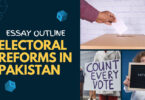
Essay Outline: Electoral Reforms in Pakistan:...
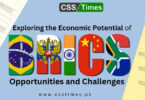
Exploring the Economic Potential of BRICS Countries:...

Instruction in Youth is Like Engraving in Stone |...

Leave a Comment X
I am highly indebited of you The CSS Times team you are doing matchless work for the candidates. I am the aspirant and highly appreciate you. May you remain blissful and happy always.

IMAGES
VIDEO
COMMENTS
CSS Forums Friday, May 03, 2024 02:27 PM (GMT +5) Home; Beginner's Guide; Rules; Syllabus; Past Papers; CSP Members : CSS Forums > CSS Compulsory Subjects > Essay: ... Essay on globalization Globalization is an irreversible and irresistible phenomenon. It is very famous all over the world. While dilating on the subject, it is important to note ...
Essay on Globalization. World as a Global Village: Learning to live together. The term 'Global Village' can easily be defined as an exchange of various cultures through telecommunications. Though it may seem simple enough considering the technological advances made in the last decade or so, the motives are clearly not there.
Pakistan #1 Platforum for CSS solved Papers. Skip to content. All Category. CSS. CSS Solved Essays; CSS Solved Precis; CSS Solved GSA; CSS Solved Pakistan Affairs; ... a Sir Syed Kazim Ali student, has attempted the CSS 2024 essay "Globalization and... Maleeha Sattar March 18, 2024; CSS, CSS Essays, CSS Solved Essays, Uncategorized; 7301 Views
CSS 2024 Solved Essay | Globalization and National Economies. Maleeha Sattar, a Sir Syed Kazim Ali student, has attempted the CSS 2024 essay "Globalization and National Economies" on the given pattern, which Sir Syed Kazim Ali teaches his students. Sir Syed Kazim Ali has been Pakistan's top English writing and CSS, PMS essay and precis coach with the highest success rate of his students.
Pros and Cons of Globalization Outline I. Introduction II. Globalization - A natural process of connecting civilizations III. Benefits accrued from Globalization a. Accelerated Economic Growth Worldwide - The Economic Aspect b. Fast, effective and developed means of communication - The Social Aspect c. Intercultural Communication - The ...
CSS, PMS Essays | Pros and Cons of Globalization for Pakistan | Best for CSS, PMS Current Affairs, Pakistan Affairs, and Essay Papers. The essay is attempted by Iqra Ali on the given pattern, which Sir Syed Kazim Ali teaches to his students, who have consistently been qualifying their CSS, PMS essays. Sir Syed Kazim Ali has been Pakistan's top English writing and CSS, PMS essay and precis ...
This essay will explore these pros and cons, shedding light on the complexities of globalization. Exposition: Understanding Globalization. Globalization can be defined as the increasing interconnectedness and interdependence of nations in various aspects, including trade, communication, and technology.
CSS Solved Political Science Past Papers. 1. Discuss In Detail The Plato's Concept Of Justice. 2. Define Democratic Peace. Highlight Its Basic Norms and Discuss How It Played a Vital Role in the Political and Economic Integration of the European Union. 3.
The negative aspects of media are through visible yet with proper implementation of positive impacts / aspects through the best policies its dark side may be countered and positive side may be made more practicable and workable. Prepared by Miss Aqsa Imtiaz (CSS & PMS 2020 qualified) Contact No. 0300-4469650.
Globalization is a general topic. But to understand all its aspects is an important undertaking before any application of this concept in Essay, Internationa...
CSS, Current Affairs, Daily Write-Ups, Education in Pakistan, Featured, Global Issues, Globalization, Opinions 5283 Views Discuss Globalization and its Effects on Pakistan's Education System
Essay on Globalization CSS Forum - Free download as PDF File (.pdf), Text File (.txt) or read online for free. essay
3.1) Distrust among the countries of the global north and south has turned the issue of global warming into a debate of historic and social justice. Case in point: Failure of the Copenhagen climate conference. 3.2) Exceptionalism exhibited by global leaders. Case in point: America's walk out of the Paris Climate Accord.
CSS 2024 Solved Essay | Globalization and National Economies Maleeha Sattar, a Sir Syed Kazim Ali student, has attempted the CSS 2024 essay "Globalization and National Economies" on the given pattern, which Sir Syed Kazim Ali teaches his students. ... CSS Prep Forum always try to bring the best to help thousands... Explore More. Bakhtawar ...
CssPrepForum is Pakistan's largest and greatest platform for CSS, PMS, FPSC, PPSC, SPSC, KPPSC, AJKPSC, BPSC, GBPSC, NTS, and other One Paper 100 Marks MCQs exams' students. It has become Pakistan's most trusted website among CSS, PMS students for their exams' preparation because of its high-quality preparation material ...
Overview of Globalization and Nationalism: ... Css Help Forum For The Beginners, Css Pakistan, English Essay, English Composition, English Composition Course, Css, Css Past Papers, Css Exam, Css ...
Globalization offers multiple advantages acknowledged by everyone and denied by none. Following are a few major pros of globalization. 1. Globalization offers Mutual Cooperation & Development. In the past, when the world was non-globalized and nationalism was prevailing, there was a lack of cooperation between states.
500+ Words Essay on Globalization. Globalization refers to integration between people, companies, and governments. Most noteworthy, this integration occurs on a global scale. Furthermore, it is the process of expanding the business all over the world. In Globalization, many businesses expand globally and assume an international image.
2. An Overview. In 1947, Pakistan had 30 million people with per capita income of 100$. Agriculture accounted for almost 50% of economic output with hardly any manufacturing, as all industries were located in India. Therefore, it was unable to feed 30 million people and was dependent on PL-480 imports from the USA.